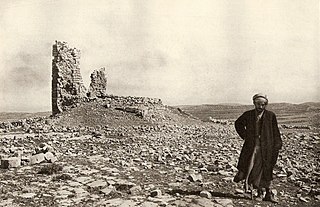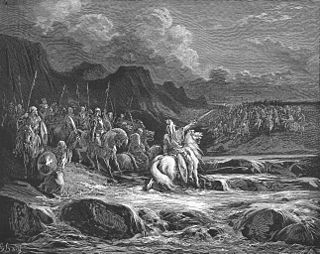This article concerns the period 169 BC – 160 BC.
Year 160 BC was a year of the pre-Julian Roman calendar. At the time it was known as the Year of the Consulship of Gallus and Cethegus and the Fourth Year of Houyuan. The denomination 160 BC for this year has been used since the early medieval period, when the Anno Domini calendar era became the prevalent method in Europe for naming years.
Year 162 BC was a year of the pre-Julian Roman calendar. At the time it was known as the Year of the Consulship of Corculum/Lentulus and Figulus/Ahenobarbus and the Second Year of Houyuan. The denomination 162 BC for this year has been used since the early medieval period, when the Anno Domini calendar era became the prevalent method in Europe for naming years.
Year 164 BC was a year of the pre-Julian Roman calendar. At the time it was known as the Year of the Consulship of Torquatus and Longinus. The denomination 164 BC for this year has been used since the early medieval period, when the Anno Domini calendar era became the prevalent method in Europe for naming years.

Demetrius I, surnamed Soter, reigned as king (basileus) of the Hellenistic Seleucid Empire from November 162 to June 150 BC. Demetrius grew up in Rome as a hostage, but returned to Greek Syria and overthrew his young cousin Antiochus V Eupator and regent Lysias. Demetrius took control during a turbulent time of the Empire, and spent much of his time fighting off revolts and challenges to his power from threats such as Timarchus and Alexander Balas.

Antiochus V Eupator, whose epithet means "of a good father" was a ruler of the Greek Seleucid Empire who reigned from late 164 to 161 BC.

The Maccabees, also spelled Machabees, were a group of Jewish rebel warriors who took control of Judea, which at the time was part of the Seleucid Empire. They founded the Hasmonean dynasty, which ruled from 167 to 37 BCE, being a fully independent kingdom from 104 to 63 BCE. They reasserted the Jewish religion, expanded the boundaries of Judea by conquest, and reduced the influence of Hellenism and Hellenistic Judaism.

Judah Maccabee was a Jewish priest (kohen) and a son of the priest Mattathias. He led the Maccabean Revolt against the Seleucid Empire.

The Battle of Beth Zechariah took place around May 162 BC during the Maccabean revolt fought between Jewish rebels under the leadership of Judas Maccabeus against an army of the Seleucid Empire, the Greek successor state (diadochi) to the Macedonian conquests that controlled Syria and Babylonia. The battle was fought at Beth Zechariah and was a Seleucid victory, with the rebels driven from the field in retreat. Judas's brother Eleazar Avaran died in combat with a war elephant. The defeat allowed the Seleucids to continue their campaign and besiege the Jewish holy city of Jerusalem.

The Battle of Emmaus took place around September 165 BC during the Maccabean Revolt between Judean rebels, led by Judas Maccabeus, and an expedition of Seleucid Empire forces under generals Gorgias, Ptolemy the son of Dorymenes, and Nicanor near Emmaus. The battle was won by the Maccabee rebels, who marched by night and surprised the Seleucid camp while many soldiers were absent. The victorious Maccabees looted the Greek camp for valuables and likely weapons to help further their cause.
Gorgias was a Syrian-Seleucid General of the 2nd century BC, in the service of Antiochus Epiphanes.

Mattathias ben Johanan was a Kohen who helped spark the Maccabean Revolt against the Hellenistic Seleucid Empire. Mattathias's story is related in the deuterocanonical book of 1 Maccabees. Mattathias is accorded a central role in the story of Hanukkah and, as a result, is named in the Al HaNissim prayer Jews add to the Birkat Hamazon and the Amidah during the festival's eight days.

The Battle of Beth Horon or Battle with Seron was fought at some point between Spring 166 BC to Spring 165 BC during the Maccabean Revolt between Judean rebels led by Judas Maccabeus and an army of the Seleucid Empire under the command of Seron, a commander of the Syrian army. Beth-Horon, or Bethoron, was a strategic mountain pass leading from the coastal plain to the Judean hill country. Utilizing guerrilla warfare tactics, the Maccabee rebels ambushed the passing Seleucid force from the pass, pursuing the surprised and fleeing remnants into the plain.
The Battle of Adasa was fought during the Maccabean revolt on the 13th of the month Adar, 161 BC at Adasa, near Beth-horon. It was a battle between the rebel Maccabees of Judas Maccabeus and the Seleucid Empire, whose army was led by Nicanor. The Maccabees won the battle after killing Nicanor early in the fighting. The battle came after a period of political maneuvering over several months where the peace deal established a year earlier by Lysias was tested by the new High Priest Alcimus, the new military governor Nicanor, and the Maccabee leader Judas Maccabeus.

The Battle of Beth Zur was fought between the Maccabees led by Judas Maccabeus and a Seleucid Greek army led by Regent Lysias in October 164 BC at Beth Zur. According to the books of Maccabees, the rebels won the battle, although how significant this victory really was is disputed; it is possible the battle's result was inconclusive. Through a stroke of good fortune for the rebels, the days after the battle likely coincided with news of Seleucid King Antiochus IV Epiphanes's death reaching Judea; rather than continue the campaign, the Seleucid army and Lysias returned to the capital to handle the leadership transition. The Maccabees were able to capture Jerusalem soon after.
Lysias was a 2nd-century BC general and governor of Syria under the Seleucid Empire.

The Battle of the Ascent of Lebonah or Battle with Apollonius was the first battle fought between the Maccabees and the Seleucid Empire in 167 or 166 BCE. The Jewish forces were led by Judas Maccabeus and the Seleucid army force was under the command of Apollonius, described by Josephus as "the strategos (general) of the Samaritan forces".

The Maccabean Revolt was a Jewish rebellion led by the Maccabees against the Seleucid Empire and against Hellenistic influence on Jewish life. The main phase of the revolt lasted from 167 to 160 BCE and ended with the Seleucids in control of Judea, but conflict between the Maccabees, Hellenized Jews, and the Seleucids continued until 134 BCE, with the Maccabees eventually attaining independence.

Il vecchio testamento, released in English as The Old Testament, and in Spanish, Los Macabeos, is a 1962 Italian/French widescreen international co-production epic film shot in Yugoslavia. It is based on the Maccabean Revolt against the Seleucid Empire of Syrian of 167–141 BC. It was directed and co-written by Gianfranco Parolini and starred Brad Harris in one of their frequent collaborations.

During the Maccabean Revolt against the Seleucid Empire, there were a series of campaigns in 163 BC in regions outlying Judea - Ammon, Gilead, Galilee, Idumea, and Judea's coastal plain, a wider region usually referred to as either Palestine or Eretz Israel. The Maccabee rebels fought multiple enemies: Seleucid garrisons and hired mercenaries under a commander named Timothy of Ammon, non-Jewish inhabitants hostile to the Maccabees and their Jewish neighbors, and possibly the Tobiad Jews, a clan that generally favored the ruling Seleucid government. During 163 BC, the main Seleucid armies composed of Greeks were elsewhere, so the Maccabees were free to expand their influence against their neighbors.











